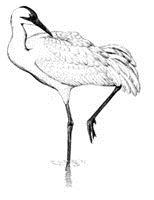North American Crane Working Group

Proceedings of the North American Crane Workshop
Date of this Version
2005
Document Type
Article
Citation
Folk, M.J., S.A. Nesbitt, S.T. Schwikert, J.A. Schmidt, K.A. Sullivan, T.J. Miller, S.B. Baynes, and J.M. Parker. Breeding biology of re-introduced non-migratory whooping cranes in Florida. In Chavez-Ramirez, F, ed. 2005. Proceedings of the Ninth North American Crane Workshop, Jan 17-20, 2003. Sacramento, California: North American Crane Working Group. Pp. 105-110.
Abstract
In the face of record-setting drought, the re-introduced flock of non-migratory whooping cranes in Florida has shown slow but steady progress toward achieving the first natural recruitment to the flock. Fourteen nests were initiated between 1999 and 2002. Two clutches have hatched a total of 4 chicks and 1 chick was raised to fledging. Captive-raised, soft-released whooping cranes have shown that they are capable of forming pair bonds, defending territories, building nests, laying fertile eggs, and hatching and rearing young. The key to the success of the project will be to have enough pairs producing enough young to offset annual flock mortality.
Included in
Behavior and Ethology Commons, Biodiversity Commons, Ornithology Commons, Population Biology Commons, Terrestrial and Aquatic Ecology Commons


Comments
Reproduced by permission of the NACWG.